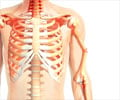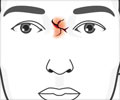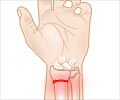A study in the New England Journal of Medicine has reveled an alternative therapy that prevents fractures in postmenopausal women with osteoporosis.

"Denosumab works in a new way to prevent bone loss" says Steven Cummings, M.D., of the San Francisco Coordinating Center at the California Pacific Medical Center Research Institute, and the lead author of the study. "This trial shows that it reduces the risk of all major types of fractures in women who have osteoporosis."
The researchers followed 7,868 women between the ages of 60 and 90 who had a previous diagnosis of osteoporosis. They were randomly assigned to get either a 60 mg injection of denosumab or a placebo every six months over three years. The women were given a spine radiograph every year to see if they had suffered any vertebral fractures. In addition the researchers measured the women's bone mineral density every year at the hip, and after 36 months at the lumbar spine.
At the end of the 36 months, 2.3 percent of the denosumab group had vertebral fractures, compared to 7.2 percent in the placebo group. Denosumab was also associated with an increase in bone mineral density of 8.8 percent at the lumbar spine and 6.4 percent at the hip, compared to the placebo group.
There were no any significant differences between the 2 groups in the overall rates of cancer, infections, or heart disease.
"Most patients who start taking pills to prevent fractures stop taking them within one year," says Dr. Cummings. "Denosumab is given twice a year as a simple injection in the doctor's office. Some patients may prefer this type of treatment and it has the potential to improve compliance with treatment"
Advertisement
Dr. Cummings received both consulting fees and grant support from Amgen for his work.
Advertisement
At San Francisco's California Pacific Medical Center, we believe in the power of medicine. We research the most up-to-date treatments, hire the most qualified individuals, and practice the most modern, innovative medicine available. We deliver the highest quality expert care, with kindness and compassion, in acute, post-acute and outpatient services, as well as preventive and complementary medicine. But we also believe that medicine alone is only part of the solution. That's why we look intently at each individual case and treat the whole person, not just the illness. It's why we go beyond medical care and provide our patients with things like disease counseling, family support and wellness treatments. As one of California's largest private, community-based, not-for-profit, teaching medical centers, and a Sutter Health affiliate, we are able to reach deep into our community to provide education, screening and financial support in some of the city's most underserved neighborhoods. Because medicine can transform a body. But going beyond medicine can transform a life.
Source-Newswise
RAS














